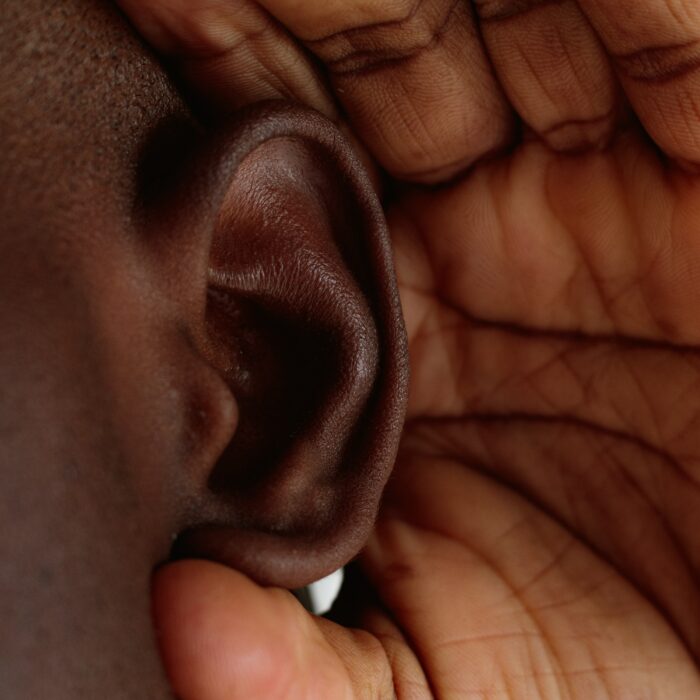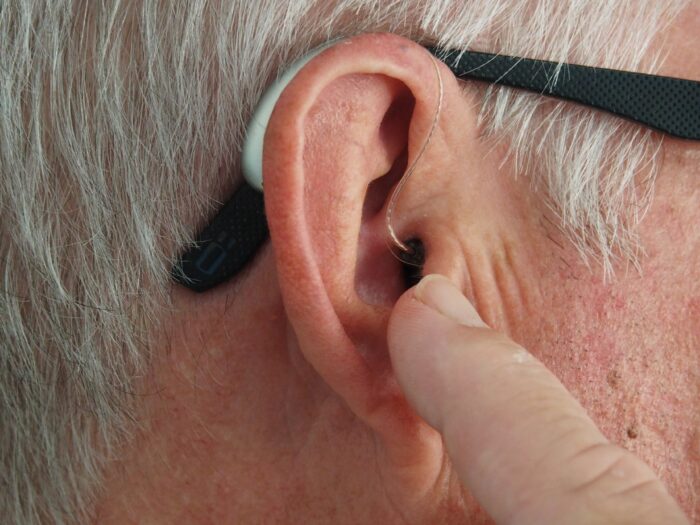Common Causes of Blocked Ears
Have you ever experienced the discomfort of a blocked ear? It can be annoying, painful, and can even affect your hearing1. If you find yourself wondering, “Why is my ear blocked?” or “How long do blocked ears last?” you’re not alone. Blocked ears are a common issue that many people encounter at some point in their lives. In this post, we will explore the various causes of blocked ears in adults and what you can do about them.
The Top Causes of Blocked Ears In Adults
Blocked ears can occur for a variety of reasons. From earwax build-up to infections2, understanding the root causes is essential for effective treatment and prevention. Let’s delve into the most common causes of blocked ears in adults.

Earwax Build-up (Cerumen Impaction)
A build-up of earwax is a common problem3. Earwax is produced inside your ears to keep them clean and free of germs3. It usually passes out of the ears harmlessly, but sometimes too much can build up and block the ears3. Untreated earwax build-up can lead to hearing loss, irritation, pain in your ear, dizziness, ringing in your ears and other issues4. Find out more about the causes and remedies for earwax build-up in our dedicated article on Reasons Why You May Be Struggling with Earwax Build Up And How Earol Can Help.
Upper Respiratory Infections
Upper respiratory infections, such as the common cold or sinusitis, often lead to blocked ears5. Tubes in the ears can get clogged with mucus and other fluid5. When fluid presses on the eardrum, it causes ear pain, swelling and redness5. It also can cause hearing loss since the eardrum cannot vibrate properly5.
Swimmer’s Ear (Otitis Externa)
If you’ve ever spent time in the water, you may have encountered swimmer’s ear. Otitis externa is a condition that causes inflammation (redness and swelling) of the external ear canal, which is the tube between the outer ear and eardrum6. Otitis externa is often referred to as “swimmer’s ear” because repeated exposure to water can make the ear canal more vulnerable to inflammation6. Swimmer’s ear can cause ear pain, itching, and some degree of hearing loss6. Usually only one ear is affected6. With treatment, these symptoms should clear up within a few days. However, some cases can persist for several months or longer6. Learn more about how to prevent and treat swimmer’s ear in our dedicated article.

Middle Ear Infections (Otitis Media)
Middle ear infection, or otitis media, is an infection of the middle ear that causes inflammation (redness and swelling) and a build-up of fluid behind the eardrum7. Anyone can develop a middle ear infection but infants between six and 15 months old are most affected7. It’s estimated that around one in every four children experience at least one middle ear infection by the time they’re 10 years old7 . In most cases, the symptoms of a middle ear infection (otitis media) develop quickly and resolve in a few days. This is known as acute otitis media. The main symptoms include7:
- earache7
- a high temperature (fever)7
- being sick7
- a lack of energy7
- slight hearing loss – if the middle ear becomes filled with fluid7
Most cases of otitis media pass within a few days, so there’s usually no need to see your GP7.
However, see your GP if you or your child have:
- symptoms showing no sign of improvement after two or three days7.
- a lot of pain7.
- a discharge of pus or fluid from the ear – some people develop a persistent and painless ear discharge that lasts for many months, known as chronic suppurative otitis media7.
- an underlying health condition, such as cystic fibrosis or congenital heart disease, which could make complications more likely7
In some cases, a hole may develop in the eardrum (perforated eardrum) and pus may run out of the ear7. The earache, which is caused by the build-up of fluid stretching the eardrum, then resolves7.
Barotrauma
“Barotrauma” is the overarching term for medical conditions caused by sudden or significant shifts in air or water pressure8. Most barotrauma conditions aren’t serious, and their symptoms go away without treatment8. But in some instances, barotrauma may be life-threatening and require immediate medical attention8. Often experienced while flying or scuba diving, it can cause blocked ears, as well as discomfort and pain8 . That stuffed-up feeling happens because the rapid change in air pressure affects your eustachian tubes connecting your middle ear and the back of your nose8. The tubes manage the amount of pressure on your eardrum, making sure there’s equal pressure on both sides. When air pressure changes quickly, it upsets the balance of pressure on your middle ear8.
Foreign Objects
Foreign bodies are common, particularly among children, who often insert objects, particularly beads, erasers, and beans, into the ear canal. Foreign bodies may remain unnoticed until they provoke an inflammatory response, causing pain, itching, infection, and foul-smelling, purulent drainage9.
In general, foreign bodies that appear easy to grasp and remove (e.g. paper, an insect wing) can be removed with alligator forceps by most practitioners9.
Ear Injuries
The ear can be injured (traumatized) in a number of different ways. The more common types of injuries are a slap to the ear, a cotton swab injury, a severe blow to the head from falling off a bicycle or having a motor vehicle accident10. These types of injuries can range from minor to severe, some requiring emergency surgery. Some of the complaints that people have after a blow to the ear include hearing loss, blocked ear, dizziness and pain10.
On examination of the ear by an HCP, one needs to check to see if there is any blood in the canal and if the drum is intact. If there is blood in the ear canal, then the patient needs to be evaluated by a doctor10.
Allergies
The lining of the Eustachian tube (passage connecting the throat to the ear) can become swollen when your immune system overreacts to an allergen11. This swelling can cause pressure and pain – along with fluid build-up and a blocked ear11.
If you have allergies, you’re at an increased risk for developing an ear infection11. The fluid buildup in your ear is a prime location for bacteria to grow and multiply. And bacteria can lead to an infection known as otitis media. Symptoms of this type of ear infection can include11:
- Dizziness and other balance issues11
- Ear pain11
- Ringing in your ears (tinnitus)11
- Trouble hearing11
Benign Paroxysmal Positional Vertigo (BPPV)
BPPV is an inner ear problem that causes short periods of vertigo when your head is moved in certain positions12. The term ‘Vertigo’ means a sensation of spinning and movement affecting you or your surroundings12. It happens most commonly when lying down, turning over in bed and looking up. The vertigo should settle within a minute. Even though you are still, you may feel like you are moving, or that the room is moving around you. You may also experience nausea, vomiting, sweating, and unusual eye movements12.
Tumours or Growths
Tumours of the ear may be noncancerous (benign) or cancerous (malignant). Most ear tumours are found when people see them or when a doctor looks in the ear because people notice their hearing seems decreased13.
Ear Canal Narrowing (Stenosis)
Ear canal stenosis can be caused by repeated ear canal infections that cause scarring14. Some children are born with stenosis14.
Medications
Many drugs, including medications, can damage the ears, these drugs are called ototoxic drugs15.
They include the antibiotics streptomycin, tobramycin, gentamicin, neomycin, and vancomycin, as well as certain chemotherapy medications (for example, cisplatin), furosemide, and aspirin15.
Whether people develop drug ototoxicity depends on many factors, including:
- How much of the drug the person took (the dose)15
- How long the person took the drug15
- Whether the person has decreased kidney function, making it harder to clear the drug from a person’s body15
- Whether the person has a family history of ear disorders caused by drugs15
- Whether the person’s genetic make-up makes the person more susceptible to the effects of ototoxic drugs15
- Whether the person is taking more than one ototoxic drug at the same time15
Excessive Ear Cleaning
For many people, earwax is manifestly too much of a good thing. An ear canal plugged up with earwax can cause earaches, infections, and other problems16. If it gets lodged in a certain way, earwax can cause a cough by stimulating the branch of the vagus nerve that supplies the outer ear. And, not surprisingly, an excess of earwax can result in some loss of hearing16.
Age-Related Changes
As people age, changes to the glands inside the ear cause your earwax to become drier, which makes it harder for your ears to clean themselves as effectively as they used to17. This, in turn, makes it more likely that wax will build up inside the ear canal and form a blockage. Blockages can be painful or cause a feeling of fullness in your ear as well as itching, discharge, or hearing loss17.

Neurological Conditions
Inner ear disorders are common and patients with vestibular failure often present to a neurology clinic because of their dizziness, gait unsteadiness and oscillopsia18. Vestibular disorders can be divided into peripheral and central vestibular disorders18. Most of the peripheral vestibular disorders have a clinical diagnosis, and a thorough history and examination will often provide a clear direction as to the diagnosis18. Correct diagnosis allows treatment for many of the peripheral and central vestibular disorders. As inner ear damage is generally irreversible, early diagnosis allowing prompt treatment is important.
Systemic Illnesses
Autoimmune inner ear disease (AIED) is an inflammatory condition caused by an uncontrolled immune system response that attacks the inner ear causing progressive sensorineural hearing loss (SNHL) that usually starts in one ear and then affects the other ear19.
The body thinks a part of the inner ear should not be there and makes antibodies, also called antigen-antibody, and immune complexes that attack the inner ear19. This causes blood vessel inflammation, inner ear tissue damage, and hearing loss19. Antigens are the molecules that cause an immune response and antibodies are proteins that protect the body against these antigens19.
Why Choose Earol for Earwax Removal
When it comes to addressing one of the most common causes of blocked ears, earwax build-up, it’s important to choose safe and effective methods for removal. Earol is a trusted solution that can help you manage and prevent earwax impaction without the need for invasive procedures or tools. Discover the benefits of Earol in our dedicated article on earwax removal.
In conclusion, blocked ears can be caused by a wide range of factors, from earwax build-up to underlying medical conditions. Understanding the root causes is crucial for effective treatment and prevention. Whether you’re dealing with earwax impaction, an upper respiratory infection, or any other issue leading to ear blockage, seeking appropriate care and guidance is essential for your ear health and overall well-being. If you’ve ever wondered, “Why does my ear keep getting blocked?” or “What causes ears to block?” this guide could help answer your questions and provide valuable insights for maintaining healthy ears.
References
1 Earwax blockage (no date) Mayo Clinic. Available at: https://www.mayoclinic.org/diseases-conditions/earwax-blockage/symptoms-causes/syc-20353004 (Accessed: 24 October 2023).
2 Higuera, V. (2023) Why does my ear feel clogged? causes and what to do, Healthline. Available at: https://www.healthline.com/health/why-does-my-ear-feel-clogged#treatments (Accessed: 24 October 2023).
3 Earwax build-up (1BC) NHS inform. Available at: https://www.nhsinform.scot/illnesses-and-conditions/ears-nose-and-throat/earwax-build-up (Accessed: 24 October 2023).
4 professional, C.C. medical (no date) Earwax blockage (cerumen impaction): Symptoms, causes & removal, Cleveland Clinic. Available at: https://my.clevelandclinic.org/health/diseases/14428-ear-wax-buildup–blockage#:~:text=Untreated%20earwax%20buildup%20can%20lead,symptoms%20go%20away%20with%20treatment. (Accessed: 24 October 2023).
5 (No date) Ear infection | Ear, nose & throat specialists | UNC Rex Healthcare … Available at: https://www.rexearnosethroat.com/rh/rex-ent-specialists/care-treatment/ear-infection/ (Accessed: 24 October 2023).
6 Otitis externa (1BC) NHS inform. Available at: https://www.nhsinform.scot/illnesses-and-conditions/ears-nose-and-throat/otitis-externa/#:~:text=Otitis%20externa%20is%20a%20condition,canal%20more%20vulnerable%20to%20inflammation. (Accessed: 24 October 2023).
7 Middle ear infection (otitis media) (1BC) NHS inform. Available at: https://www.nhsinform.scot/illnesses-and-conditions/ears-nose-and-throat/middle-ear-infection-otitis-media/#:~:text=middle%20ear%20infections-,About%20middle%20ear%20infections,of%20fluid%20behind%20the%20eardrum. (Accessed: 24 October 2023).
8 professional, C.C. medical (no date b) Under pressure, Cleveland Clinic. Available at: https://my.clevelandclinic.org/health/diseases/22071-barotrauma (Accessed: 24 October 2023).
9 Kesser, B.W. (2023) External ear obstructions – ear, nose, and throat disorders, MSD Manual Professional Edition. Available at: https://www.msdmanuals.com/en-gb/professional/ear,-nose,-and-throat-disorders/external-ear-disorders/external-ear-obstructions#:~:text=(Ear%20Foreign%20Body)&text=The%20ear%20canal%20may%20be,with%20proper%20lighting%20and%20instruments. (Accessed: 24 October 2023).
10 School, M.M. (2022) Ear trauma discussion, Otorhinolaryngology – Head & Neck Surgery. Available at: https://med.uth.edu/orl/online-ear-disease-photo-book/chapter-12-ear-trauma/ear-trauma-discussion/#:~:text=Some%20of%20the%20complaints%20that,be%20evaluated%20by%20a%20doctor. (Accessed: 24 October 2023).
11 Can allergies affect your ears? (no date) Riverside. Available at: https://www.riversideonline.com/patients-and-visitors/healthy-you-blog/blog/c/can-allergies-affect-your-ears#:~:text=Allergies%20and%20your%20ears&text=The%20lining%20of%20the%20Eustachian,buildup%20and%20a%20blocked%20ear. (Accessed: 24 October 2023).
12 (No date) NHS choices. Available at: https://www.nhslanarkshire.scot.nhs.uk/services/physiotherapy/vestibular-physiotherapy/benign-paroxysmal-positional-vertigo-bppv/#:~:text=BPPV%20is%20an%20inner%20ear,in%20bed%20and%20looking%20up. (Accessed: 24 October 2023).
13 Kesser, B.W. (2023) Ear tumors – ear, nose, and throat disorders, MSD Manual Consumer Version. Available at: https://www.msdmanuals.com/en-gb/home/ear,-nose,-and-throat-disorders/outer-ear-disorders/ear-tumors#:~:text=Noncancerous%20ear%20tumors&text=Most%20osteomas%20and%20exostoses%20are,hearing%20usually%20returns%20to%20normal. (Accessed: 24 October 2023).
14 Ear Canal Exostoses and Ear Canal stenosis (no date) Stanford Medicine Children’s Health. Available at: https://www.stanfordchildrens.org/en/service/hearing-center/conditions/ear-canal#:~:text=Ear%20canal%20stenosis%20can%20be,have%20many%20ear%20canal%20infections.&text=The%20Children%27s%20Hearing%20Center%20team,and%20eardrum%20with%20a%20microscope. (Accessed: 24 October 2023).
15 Hamiter, M. (2023) Ear disorders caused by drugs – ear, nose, and throat disorders, MSD Manual Consumer Version. Available at: https://www.msdmanuals.com/en-gb/home/ear,-nose,-and-throat-disorders/inner-ear-disorders/ear-disorders-caused-by-drugs#:~:text=These%20drugs%20are%20called%20ototoxic,)%2C%20furosemide%2C%20and%20aspirin. (Accessed: 24 October 2023).
16 Got an ear full? here’s some advice. (2021) Harvard Health. Available at: https://www.health.harvard.edu/staying-healthy/got-an-ear-full-heres-some-advice-for-ear-wax-removal (Accessed: 24 October 2023).
17 Is my ear problem related to my age? (2017) Harvard Health. Available at: https://www.health.harvard.edu/diseases-and-conditions/is-my-ear-problem-related-to-my-age#:~:text=As%20people%20age%2C%20changes%20to,canal%20and%20form%20a%20blockage. (Accessed: 24 October 2023).
18 Agrup, C., Gleeson, M. and Rudge, P. (2007) The inner ear and the neurologist, Journal of neurology, neurosurgery, and psychiatry. Available at: https://www.ncbi.nlm.nih.gov/pmc/articles/PMC2077664/ (Accessed: 24 October 2023).
19 Autoimmune inner ear disease (2022) ENT Health. Available at: https://www.enthealth.org/conditions/autoimmune-inner-ear-disease/ (Accessed: 24 October 2023).





